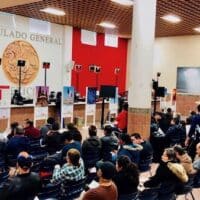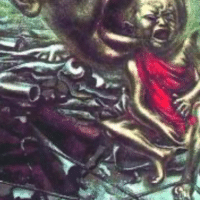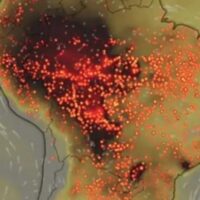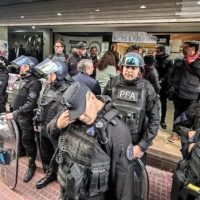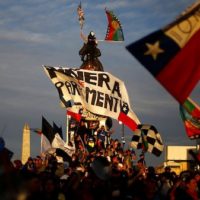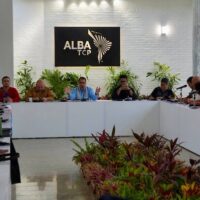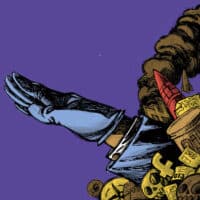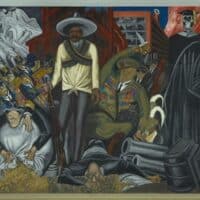-
Immigration as a political weapon
Hundreds of migrants have been illegally deported by the U.S. to these infamous prisons, currently there are approximately 110,000 prisoners across the country; approximately 85,000 of these prisoners have been arrested since the start of the state of exception, an emergency measure that has been renewed 36 times by the National Assembly since its promulgation in March 2022.
-
Colonial mining fuels Israeli genocide: global protests target Glencore
Glencore, one of the world’s largest mining conglomerates at the confluence of worker exploitation, environmental destruction, and genocide, brought Palestine solidarity activists, trade unionists and mining affected communities together in a unified protest.
-
U.S. reinstates funding to propaganda outlet NED
The brief freeze and rapid partial reinstatement of National Endowment for Democracy (NED) funding in early 2025 helped expose it as a U.S. regime-change tool.
-
Latin America’s long fight against the U.S. for sovereignty
John Perry reviews the book AMERICA, AMÉRICA: A New History of the New World, by Greg Grandin.
-
The long history of illegality in U.S. policy toward Latin America
It seems as if the entire disgraceful history of U.S. illegality in Latin America is distilled in the saga of Kilmar Ábrego García: the man whose illegal deportation to El Salvador and imprisonment in the Terrorism Confinement Center (CECOT) has sparked outrage in the United States among human rights defenders and opponents of the Trump administration.
-
Meet the DC think tanks impoverishing masses of Latin Americans
These top Washington think tanks are lobbying lawmakers for sadistic sanctions on some of the hemisphere’s poorest countries while raking in millions from corporations and arms makers.
-
Trump’s policy toward Latin America: Even anti-Communist Zealots in Miami don’t like it
The Trump administration’s volatility on foreign policy reveals internal divisions within Trumpism. But when threats and populism lose their momentum, the anti-communist hawks may get their way.
-
The real French Connection was CIA approved
While the French Connection imported opium from Turkey, later in the 1960s the center of heroin production shifted to Southeast Asia against the backdrop of the Vietnam War. The CIA’s Air America transported the junk.
-
Mass incarceration arose out of empire building across North America, Carribean and Pacific
The United States today has by far the world’s largest incarceration rate, with nearly two million people living in prisons and jails. The conditions in those facilities are often substandard, with Amnesty International criticizing the dehumanizing practice of holding prisoners in prolonged solitary confinement. Benjamin Weber’s book, American Purgatory: Prison Imperialism and the Rise of […]
-
Mexico prepares its consulates in the U.S. to face Trump’s mass deportations
Mexican President Claudia Sheinbaum reaffirms support for migrants amid Trump’s deportation plans, and proposes a regional summit to address the causes of immigration.
-
Southern Command launches an attack on China and Russia in Latin America
Laura Richardson, leader of the U.S. military’s Southern Command, recently called for the development of a new “Marshall Plan”, aimed at Latin America to counter the growing influence of Russia and China in the region.
-
Our full support for the Anti-Fascist International
A constant in two centuries of U.S. interference in the region is the obsession to destroy any sovereign or moderately progressive project.
-
South America faces one of the worst waves of wildfires in recent years
Most of the fires have been caused by deliberate burning of lands and improper disposal of highly polluting waste.
-
The return of the Condor: Signs of a Latin America under siege
Argentina woke up on September 2 with the University of the Mothers (UNMA) fenced off and surrounded by members of the national police, who prevented workers from accessing the center.
-
The Bloody Rise of the West – Part 2
THE impact of the West’s encounter with the Americas was devastating for its people.
-
Leftists or Right-wingers in camouflage
Every day it is proven that some characters who have come to power in Latin America under the propagandistic cloak of projecting leftist positions have only been disguised, or rather infiltrated, to favor the United States in its goal of maintaining political and economic control in the region.
-
Declaration of the 11th Extraordinary Summit of Heads of State and Government of ALBA-TCP
Being the sister Bolivarian Republic of Venezuela a founding member country of the ALBA-TCP, a unionist project, envisioned by the Liberator Simón Bolívar and the heroes of the independence deeds of Latin America and the Caribbean and realized by Commanders Hugo Rafael Chávez Frías and Fidel Castro Ruz; the member countries of this great Alliance acknowledge that this kind Our American nation is a sovereign and independent country, with high democratic standards, which, in compliance with its sacred Constitution, organized presidential elections, in accordance with the corresponding regulatory times.
-
The weakness of progressive Latin American governments in these precarious times: The Thirty-Fourth Newsletter (2024)
Unwilling to accept election results in Venezuela, the OAS, led by the U.S., passed a resolution essentially asking the country to violate its own election laws. Many countries with supposedly centre-left or left governments have joined the U.S. in proposals that seek to undermine Venezuelan democratic processes, a reflection of the contradictions confronting the current progressive cycle of governments and weakness of the left in Latin America today.
-
Dossier no. 79: To Confront Rising Neofascism, the Latin American Left Must Rediscover Itself
The Tricontinental presents a broad overview of the Latin American far right’s political, economic, and cultural programs and how the absence of a real left political project that secures better living conditions has thrown different fractions of the working class into the grip of neofascism.
-
The Country of the Rust Belt and the Broken Road: The Thirtieth Newsletter (2024)
From the 1942 ‘American century’ to Trump’s ‘American carnage’, the U.S. has shifted from a post-WW2 boom to decline, facing political divides, economic crisis, poverty, and social decay.

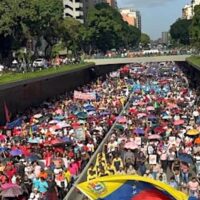
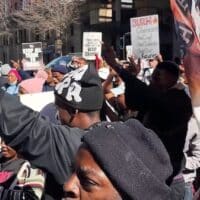


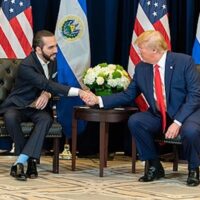
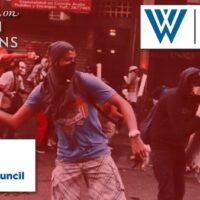
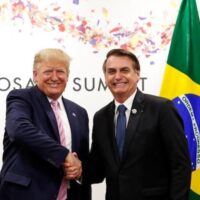

![[Source: newyorker.com]](https://mronline.org/wp-content/uploads/2025/01/Screenshot-2025-01-14-at-42345 PM-200x200.png)
